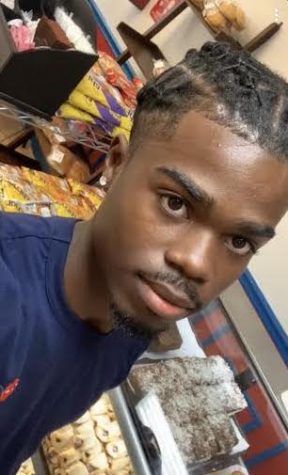A conversation with Officer Williamson
December 21, 2021
Recently we interviewed School Resource Officer Eric Williamson. Williamson is a police patrolman in the Community Service Unit of the Everett Police Department, and his job is to keep Everett High safe.
Williamson isn’t completely sure how long he will be working in EHS but in the time that he is here, he hopes to have a positive impact on as many people as he can and supply people with mentors and motivation to succeed.
Unlike how they are viewed, it is important to remember that police officers are all just people and you can really see that through Williamson’s responses. We get to see how Officer Williamson really sees things and we even go into how he’s like at home for a bit.
Officer Williamson proves to us that he really does enjoy what he does and he tells us how he feels about how others view him.
KEDERSON: Why do you think having an officer in the school is good? Other young adults think it’s not a good idea and others feel unsafe and think you guys do nothing. Do you think you keep the school safe ?
WILLIAMSON: I hope my presence has impacted the safety of the students. If anyone who has any thought of doing anything threatening or unsafe will be like, oh shoot, there are two cops who are always in the school, I hope my presence at the very least is a deterrent, but I know I can’t be everywhere at once.
SHISHIR: What are your thoughts on people that oppose having police officers at school?
WILLIAMSON: My thoughts are, I don’t disagree with them. Anyone who has that determination for a justifiable reason, they have the reason to feel that. So, there needs to be a conversation about why and how they feel that way and something needs to be done to prevent that from happening. The conversation shouldn’t be “We shouldn’t have cops in school,” the conversation should be, “We should have the right cops in school,” because you need to have the right person for the job. It is unfortunate that in some communities, towns, cities, that doesn’t happen. I only work for the police department here in Everett, I can’t tell you what other department policies or how they do things are. I don’t know how the School Resource Officer was chosen at Medford, Malden or Revere. I don’t know them, right? I just know what we do here in this police department. So, if people do feel that way, they should have those conversations. Those conversations need to be held.
ZINEB: What made you want to come to the high school and work with students?
WILLIAMSON: This is my why, this is why I wanted to become a cop: do you remember what happened back in 2015 in Ferguson, Missouri? I know you were kind of young, but there was a lot of rioting and protesting after Michael Brown was shot and killed by the police. Anyone can hold up a sign across the street and say that there is injustice, or systematic racism or police brutality or, anyone can hold up a sign or throw a brick through a window and riot and say that there’s all these problems, right? All of that is, I’m not gonna say good, but all of that does need to take place in society but what I’ve come to realize is, the very next day the same people who created those laws, the same people that made those rules, the same people that did whatever actions people are protesting about, they’re going back to work. They’re going right back to their jobs to find another way to achieve their goals or enforce the rules, the laws, or whatever they were doing to cause people to protest or riot or say that there’s systematic racism or injustice everyday. So for me, it is important to be the change, right? To wear the badge, to do the job, to be the sergeant, to hold people accountable, to become the chief of police and create the culture where you have to treat people with respect and follow the laws and do things the right way, right. So in each position I’m in, it is my goal to find a way to have the biggest impact on society that I can. In this position, working in the high school and being able to impact teenagers, to me, is the best that I can do to hopefully create connections and build relationships with people that will help you in your futures to become successful one way or another. Like if, I know this is cliche, but if one kid says to themselves, “Hey I shouldn’t do that, ‘cause you know I had that conversation with Officer Williamson,” or if I can help a student figure out what college they want to go to, or, I try to do anything and everything it takes to keep a kid out of trouble. That means help a kid get a job, get a suit for a kid, help a kid find food, help with homework, whatever it takes I will do. And that is what I’m here for. That’s why I chose this job.
KEDERSON: Did you choose to work at the school?
WILLIAMSON: Yes, I had to apply, I had to be interviewed. You got to want to be here. There is a process to get this position.
KEDERSON: Do you think it’s easier dealing with young adults rather than criminals or older people?
WILLIAMSON: The way I look at it, adults are broken. I don’t want to spend my time with broken adults. There’s potential to shape and build you guys. There’s a future here.
DAMIAN: When you were younger, did you ever imagine yourself being a police officer?
WILLIAMSON: No I did not, it actually took me a while because when I was a kid I was a real goofball. It took a lot of courage.
ALICE: What is one special thing about your job?
WILLIAMSON: The special thing about my job is the impact that it can have. One of the most gratifying days for me is graduation. Last year I went to graduation. I didn’t realize how many students I had impacted in some way until they came over to say “thank you” or introduce me to their families or hug me and cry. It was probably the best feeling I have ever had as a cop.
ZAKIAH: What kind of work do you do outside of EHS?
WILLIAMSON: Outside of Everett High, I find ways to help people in the community, planning city events, and finding ways to build up the community.
MATIAS: What are your goals?
WILLIAMSON: My goal is to be the chief of police in Everett. That is my ultimate career goal is to be at a point where I can potentially be the chief of police in Everett. There is a milestone prior to that but that is my ultimate goal.
REBECCA: What keeps you motivated to go to work everyday?
WILLIAMSON: This. I would much rather be doing stuff like this [speaking with students in a classroom] than dealing with any problems or anything like that. Secretly, I want to be a teacher. In my heart I think that is the career path I would have liked to have gone if I wasn’t such a knucklehead in high school. I love jumping into classrooms and trying to help teach classes and talk to students. The problem with being a cop is most people interact with the police when something is wrong. That’s how most people generally interact with the police. One of the things I try to focus on working in this building is creating positive interactions when there’s nothing wrong, when there’s no problem. For you guys to see that I am just a person. I like BBQ, when I go home I take my shoes off and I put on my Crocs. I keep my Crocs and sweatpants on all weekend. I’m just a person. I’m not a robot that carries a badge and a gun and a radio. That’s not who I am. So doing stuff like this is what keeps me motivated.
ZINEB: Do you think that your job has affected the way you parent?
WILLIAMSON: Oh absolutely. Absolutely. Hands down. So my thirteen year old, so I have three kids. I have a nineteen-year-old daughter, a sixteen-year-old son, and a thirteen-year-old. My daughter is a sophomore at college. She goes to Washington State University, she has a scholarship for crew. My baby’s a beast, she’s like the success child. She’s the one that’s gonna take care of me when I’m old, you know. My sixteen year old is on the fence, we’ll see how that goes. He’s six foot five, can’t dribble, can’t dunk. Had dreams of him going to the NBA, not gonna happen, so he does the high jump, he does track, video gamer, you know, that stuff. My thirteen year old is just like me. Just like me. Like someone took the pieces of me, and then like molded him, and they were like here you go, deal with it. Deal with the way you used to be. So now that I am a father, a police officer, and a school resource officer I try to look at the whole picture and not just my side. I try to look at how my son fits into society and not just how my son is behaving. I learned that parenting is an art and a science, it is both. Because no matter what you do, you mess your kids up. Like parenting itself is just, you’re just creating trauma. No matter what you say, no matter how you act your kids aren’t gonna like it. You’re gonna be like, your parents are annoying, your parents are overbearing, or OD, whatever my son likes to say, I’m being OD all the time, like I’m sorry I care about you. Sorry I want you to have a successful future if you have a hard time with that, get over it. But I try to mix the art and the science behind it. Like I try to learn a lot about like, I try to be trauma informed and figure out how, because me and my ex are divorced, and my kids live in California, I live across the country. I try to learn and understand how trauma impacts their behavior, and that’s something I would not have done if I wasn’t in this position.
MELIODAS: What is one thing you’ve learned about yourself?
WILLIAMSON: I learned that I am capable of a lot more than what I expected. One of the reasons I struggled in school is because I have severe dyslexia. As a kid, even till this day, I am desperately afraid of reading out loud. If you tell me there’s someone with a gun, I would have no problem running in that direction and going to deal with that issue but if you told me to grab one of these books and open it up to read something aloud, not gonna happen. I’m gonna fight you tooth and nail, it’s not gonna happen. I’m not gonna read something out loud. I love to read but I’m still afraid. I have three kids, my thirteen year old has dyslexia and I know and understand the challenges that he faces and one of the reasons why I got my masters degree was to prove to my son it is not a limitation. If you work hard enough, you can conquer anything and doing that I learned that I was capable of doing a lot more than I thought.
REBECCA: What’s the best piece of advice someone has ever given you? Does it still stick with you today?
WILLIAMSON: So many. So one of the reasons I am a cop is because when I was sixteen I should have gotten arrested for something. I beat up a guy who was beating up his girlfriend, lost my mind, just started beating the dude up. I had a lot of domestic violence in my household growing up, so I’ve always struggled with that. I was walking down the street with my friends, and saw a guy beating up his girlfriend. I went over there and just started not behaving myself very well. The cops came, other adults that probably should’ve helped came out and said that I was defending her, whatever. The cops took me to the police station and made me wait for my mom to get there. While I was waiting, it was cold there. All I remember is that it was really cold and I had on shorts and a t-shirt. And I remember a cop, and I really wish I could remember this guy’s name, but I don’t remember his name. He gave me a Snickers bar and he told me that if I wanted to make a difference then I should become a cop. And that stuck with me and stayed with me. Maybe it kept me out of trouble later in life. I’m sure there were some times when I told myself I probably shouldn’t do something because if I did it then I might not ever have the chance of becoming a cop. That would have to be a piece of advice that has stuck with me for the longest period of time that I know has left an impact on my life.
SHISHIR: Do you have any regrets?
WILLIAMSON: Oh yes, I’ve got lots of regrets. Absolutely. That’s what life is, dealing with your regrets. But I also have to acknowledge that if I haven’t done anything that I regret doing, I wouldn’t have the life experience that I had, and wouldn’t have taken a path that I had taken. I appreciate my regrets as much as I appreciate my accomplishments.
REBECCA: What’s a book that you read that you feel like impacted you in a way?
WILLIAMSON: I love talking about books. Every book I’ve read, I guess has impacted me in a way. One of my favorite authors is Jason Reynolds, he’s a young adult author. On the Come Up, The Hate U Give. I love ‘em. All American Boys. I like to read but I also like to listen to audiobooks at the same time. I try to read a series of books and listen to a fun book on my commute to and from work to kind of break things up. Right now I’m listening to Percy Jackson and the Lightning Thief. That book is dope so I’m really enjoying that too. I am all over the place. When I went back, I did like the “High school series” like all the books I was supposed to read in high school like Of Mice and Men, so I tried to read all of those to make up for the lost time. I did what I call a “mom series,” like all the books I know my mom has read that I remember as a child because my mom loves to read too. Like Maya Angelou, I’ve read all of those. I’m a nerd, I love it. I never thought I’d be at a point in my life where I look forward to going home and making some tea and sitting in my leather recliner and reading. My wife knows that when I’m in my recliner to just leave me alone. I go home, kick my shoes off, throw on my sweatpants, make some tea, get my crocs, get in the leather recliner, I drink tea then I switch to Bourbon, and I read. That’s my time.
SHISHIR: What is your favorite sports team? Any sport.
WILLIAMSON: I am at the point now in my life that I don’t follow sports. I am over it. It took me a few years to get there. When I was younger, I really liked sports. I liked the Patriots, I’d watch any basketball game. I love college basketball, like March Madness was definitely one of the best basketball you get to see other than the NBA Finals. I love Duke. But I am at the point now where I realized, why should I live vicariously through other people? They are not worrying about me getting paid, why should I, you know, help them? I’ve got better things to do. That’s time I could be spending with my wife, that’s time I could spend reading. I am just over it.
MATIAS: If you had the change to time travel would you do it and why?
WILLIAMSON: Yes I would time travel. I would go back and I think I would try to travel back as the person I am now and attempt to fix some of the mistakes I made. Here is how I would answer that, I would let the mistake happen, but I would change the way I acted after. I would not go back and prevent the mistake that I made, but I would change the way I behaved or acted.
ZAKIAH: What are your top three songs?
WILLIAMSON: “A House is Not A Home” by Luther Vandross. A childhood favorite, “Fire and Desire” by Rick James, and “Project Windows” by Nas.
ZAKIAH: Favorite shoe brand?
WILLIAMSON: I absolutely love Crocs.




